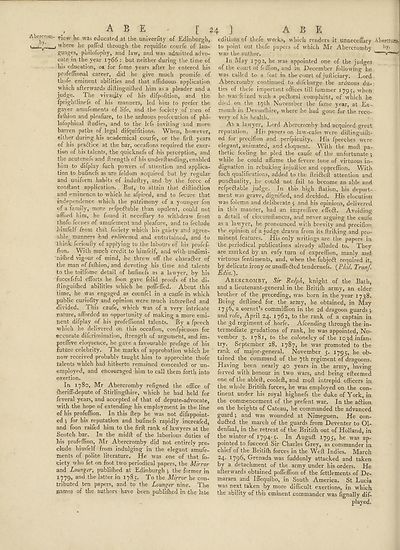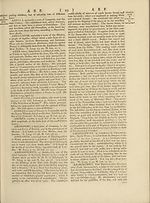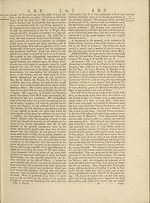Encyclopaedia Britannica, or, a Dictionary of arts, sciences, and miscellaneous literature : enlarged and improved. Illustrated with nearly six hundred engravings > Volume 1, A-AME
(42) Page 24
Download files
Complete book:
Individual page:
Thumbnail gallery: Grid view | List view

ABE • [ j
view lie was educated at the univerfity of Edinburgh,
where he paffed through the requiiite courfe of lan¬
guages, philolbphy, and law, and was admitted advo¬
cate in the year 1766 : but neither during the time of
his education, ok for fome years after he entered his
profeilional career, did he give much promife of
thofe eminent abilities and that affiduous application
which afterwards ditfinguilhed him as a pleader and a
judge. The vivacity of his difpolition, and the
fprightlinefs of his manners, led him to prefer the
gayer amufements of life, and the fociety of men of
fa (hi on and pleafure, to the arduous profetution of phi-
lolophical (Indies, and to the iefs inviting and more
barren paths of legal difquifitions. When, however,
either during his academical courfe, or the firif years
of his practice at the bar, occafions required the exer¬
tion of his talents, the qnicknefs of his perception, and
the acutenefs and ftrength of his underftanding, enabled
him to difplay fuch powers of attention and applica¬
tion to bufinefs as are feldom acquired but by regular
and uniform habits of induftry, and by the force of
conftant application. But, to attain that diftin&ion
and eminence, to which lie afpired, -and to fecure that
independence which the patrimony of a younger fon
of a family, more refpeftable than opulent, could not
afford him, he found it neceflary to withdraw from
thofe. feenes of amufement and pleafure, and to feclude
himfelf from that fociety which his gaiety and agree¬
able manners had enlivened and entertained, and to
"think ferioufiy of applying to the labours of his profef-
fion. With much credit to himfelf, and with undimi-
'milled vigour of mind, he threw o(f the chara61er of
the man of fadiion, and devoting his time and talents
to the toilfome detail of bufinefs as a lawyer, by his
fliccefsful efforts he foon gave folid proofs of the di-
ffinguifhed abilities which he poffeffed. About this
time, he was engaged as counfel in a caufe in which
public curiofity and opinion were much int'ere(fed and
divided. This caufe, which was of a very intricate
nature, afforded an opportunity of making a more emi¬
nent difplay of his profeffional talents. By a fpeech
which he delivered on this occafion, confpicuous for
eccurate diferimination, (frength of argument, and im-
prelfive eloquence, he gave a favourable prefage of his
future celebrity. The marks of approbation which he
now received probably taught him to appreciate thofe
talents which had hitherto remained concealed or un¬
employed, and encouraged him to call them forth into
exertion.
In 1780, Mr Abercromby refigned the office of
ffieriff-depute of Stirlingffiire, which he had held for
feveral years, and accepted of that of depute-advocate,
with the hope of extending his employment in the line
of his profeffion. In this ftep he was not difappoint-
ed *, for his reputation and bufinefs rapidly increafed,
and foon raifed him to the firft rank of lawyers at the
Scotch bar. In the midft of the laborious duties of
his profeffion, Mr Abercromby did not entirely pre¬
clude bimfelf from indulging in the elegant amufe-
ments of polite literature. He was one of that fo¬
ciety who fet on foot two periodical papers, the Mirror
and Lounger, publiffied at Edinburgh ; the former in
1779, and the latter in 1785. To the Mirror he con¬
tributed ten papers, and to the Lounger nine. The
names of the authors have been publifhed in the late
4 ] ABE
editions of thefe works, which renders it unneceltary Aberc
to point out thofe papers of which Mr Abercromby bX
wTas the author. * ——y-
In May 1792, he was appointed one of the judges
of the court of feffion, and in December following he
was called to a feat in the court of judiciary. Lord
Abercromby continued to difeharge the arduous du¬
ties of thefe important oftices till fummer 1795, when
he was'feized with a pe&oral complaint, of which he
died on the 1,7th November the fame year, at Ex-
mouth in Devonffiire, where he had gone for the reco¬
very of his health.
As a lawyer, Lord Abercromby had acquired great
reputation. His papers on law-cafes were diftinguifii-
ed for precifion and perfpieuity. His fpeeches were
elegant, animated, and eloquent. With the moft pa¬
thetic feeling he pled the caufe of the unfortunate ;
while he could affume the fevere tone of virtuous in¬
dignation in rebuking injuftice and oppreffion. With
fuch qualifications, added to the ftri&eA attention and
punftuality, he could not fail to become an able and
refpedlable judge. In this high ftation, his deport¬
ment was grave, dignified, and decided. His elocution
was folemn and deliberate j and his opinions, delivered
in tins manner, had an impreffive effe£h Avoiding
a detail of cireumftances, and never arguing the caufe
as a lawyer, he pronounced with brevity and precifion
the opinion of a judge drawn from its ftriking and pro¬
minent features. His only writings are the papers in
the periodical publications already alluded to. They
are marked by an eafy turn of expreffion, manly and
virtuous fentiments, and, when the fubjeft required it,
by delicate irony or unaffefted tendernefs. (P/z//. Tranf,
Edin.).
Abercromby, Sir Ralph, knight of the Bath,
and a lieutenant-general in the Britiffi army, an elder
brother of the preceding, was born in the year 1738.
Being deftined for the army, he obtained, in May
1756, a cornet’s commiffion in the 2d dragoon guards y
and rofe, April 24. 1762, to the rank of a captain in
the 3d regiment of horfe. Afcending through the in¬
termediate gradations of rank, he was appointed, No¬
vember 3. 1781, to the colonelcy of the 103d infan¬
try. September 28. 1787, he was promoted to the
rank of major-general. November 5. 1795, he ob¬
tained the command of the 7th regiment of dragoons.
Having been nearly 40 years in the army, having
ferved with honour in two wars, and being efteemed
one of the ableft, cooleft, and moft intrepid officers in
the whole Britiffi forces, he was employed on the con¬
tinent under his royal highnefs the duke of York, in
the commencement of the prefent war. In the aftion
on the heights of Gateau, he commanded the advanced
guard j and was wounded at Nimeguen. He con¬
duced the march of the guards from Deventer to Ol-
denfaal, in the retreat of the Britilh out of Holland, in
the winter of 1794-5. In Auguft 1795, he was ap¬
pointed to fucceed Sir Charles Grey, as commander in
chief of the Britiffi forces in the Weft Indies. March
24. 1796, Grenada was fuddenly attacked and taken
by a detachment of the army under his orders. He
afterwards obtained poffeffion of the fettlements of De-
marara and Iflequibo, in South America. St Lucia
was next taken by more difficult exertions, in which
the ability of this eminent commander was fignally dif-
view lie was educated at the univerfity of Edinburgh,
where he paffed through the requiiite courfe of lan¬
guages, philolbphy, and law, and was admitted advo¬
cate in the year 1766 : but neither during the time of
his education, ok for fome years after he entered his
profeilional career, did he give much promife of
thofe eminent abilities and that affiduous application
which afterwards ditfinguilhed him as a pleader and a
judge. The vivacity of his difpolition, and the
fprightlinefs of his manners, led him to prefer the
gayer amufements of life, and the fociety of men of
fa (hi on and pleafure, to the arduous profetution of phi-
lolophical (Indies, and to the iefs inviting and more
barren paths of legal difquifitions. When, however,
either during his academical courfe, or the firif years
of his practice at the bar, occafions required the exer¬
tion of his talents, the qnicknefs of his perception, and
the acutenefs and ftrength of his underftanding, enabled
him to difplay fuch powers of attention and applica¬
tion to bufinefs as are feldom acquired but by regular
and uniform habits of induftry, and by the force of
conftant application. But, to attain that diftin&ion
and eminence, to which lie afpired, -and to fecure that
independence which the patrimony of a younger fon
of a family, more refpeftable than opulent, could not
afford him, he found it neceflary to withdraw from
thofe. feenes of amufement and pleafure, and to feclude
himfelf from that fociety which his gaiety and agree¬
able manners had enlivened and entertained, and to
"think ferioufiy of applying to the labours of his profef-
fion. With much credit to himfelf, and with undimi-
'milled vigour of mind, he threw o(f the chara61er of
the man of fadiion, and devoting his time and talents
to the toilfome detail of bufinefs as a lawyer, by his
fliccefsful efforts he foon gave folid proofs of the di-
ffinguifhed abilities which he poffeffed. About this
time, he was engaged as counfel in a caufe in which
public curiofity and opinion were much int'ere(fed and
divided. This caufe, which was of a very intricate
nature, afforded an opportunity of making a more emi¬
nent difplay of his profeffional talents. By a fpeech
which he delivered on this occafion, confpicuous for
eccurate diferimination, (frength of argument, and im-
prelfive eloquence, he gave a favourable prefage of his
future celebrity. The marks of approbation which he
now received probably taught him to appreciate thofe
talents which had hitherto remained concealed or un¬
employed, and encouraged him to call them forth into
exertion.
In 1780, Mr Abercromby refigned the office of
ffieriff-depute of Stirlingffiire, which he had held for
feveral years, and accepted of that of depute-advocate,
with the hope of extending his employment in the line
of his profeffion. In this ftep he was not difappoint-
ed *, for his reputation and bufinefs rapidly increafed,
and foon raifed him to the firft rank of lawyers at the
Scotch bar. In the midft of the laborious duties of
his profeffion, Mr Abercromby did not entirely pre¬
clude bimfelf from indulging in the elegant amufe-
ments of polite literature. He was one of that fo¬
ciety who fet on foot two periodical papers, the Mirror
and Lounger, publiffied at Edinburgh ; the former in
1779, and the latter in 1785. To the Mirror he con¬
tributed ten papers, and to the Lounger nine. The
names of the authors have been publifhed in the late
4 ] ABE
editions of thefe works, which renders it unneceltary Aberc
to point out thofe papers of which Mr Abercromby bX
wTas the author. * ——y-
In May 1792, he was appointed one of the judges
of the court of feffion, and in December following he
was called to a feat in the court of judiciary. Lord
Abercromby continued to difeharge the arduous du¬
ties of thefe important oftices till fummer 1795, when
he was'feized with a pe&oral complaint, of which he
died on the 1,7th November the fame year, at Ex-
mouth in Devonffiire, where he had gone for the reco¬
very of his health.
As a lawyer, Lord Abercromby had acquired great
reputation. His papers on law-cafes were diftinguifii-
ed for precifion and perfpieuity. His fpeeches were
elegant, animated, and eloquent. With the moft pa¬
thetic feeling he pled the caufe of the unfortunate ;
while he could affume the fevere tone of virtuous in¬
dignation in rebuking injuftice and oppreffion. With
fuch qualifications, added to the ftri&eA attention and
punftuality, he could not fail to become an able and
refpedlable judge. In this high ftation, his deport¬
ment was grave, dignified, and decided. His elocution
was folemn and deliberate j and his opinions, delivered
in tins manner, had an impreffive effe£h Avoiding
a detail of cireumftances, and never arguing the caufe
as a lawyer, he pronounced with brevity and precifion
the opinion of a judge drawn from its ftriking and pro¬
minent features. His only writings are the papers in
the periodical publications already alluded to. They
are marked by an eafy turn of expreffion, manly and
virtuous fentiments, and, when the fubjeft required it,
by delicate irony or unaffefted tendernefs. (P/z//. Tranf,
Edin.).
Abercromby, Sir Ralph, knight of the Bath,
and a lieutenant-general in the Britiffi army, an elder
brother of the preceding, was born in the year 1738.
Being deftined for the army, he obtained, in May
1756, a cornet’s commiffion in the 2d dragoon guards y
and rofe, April 24. 1762, to the rank of a captain in
the 3d regiment of horfe. Afcending through the in¬
termediate gradations of rank, he was appointed, No¬
vember 3. 1781, to the colonelcy of the 103d infan¬
try. September 28. 1787, he was promoted to the
rank of major-general. November 5. 1795, he ob¬
tained the command of the 7th regiment of dragoons.
Having been nearly 40 years in the army, having
ferved with honour in two wars, and being efteemed
one of the ableft, cooleft, and moft intrepid officers in
the whole Britiffi forces, he was employed on the con¬
tinent under his royal highnefs the duke of York, in
the commencement of the prefent war. In the aftion
on the heights of Gateau, he commanded the advanced
guard j and was wounded at Nimeguen. He con¬
duced the march of the guards from Deventer to Ol-
denfaal, in the retreat of the Britilh out of Holland, in
the winter of 1794-5. In Auguft 1795, he was ap¬
pointed to fucceed Sir Charles Grey, as commander in
chief of the Britiffi forces in the Weft Indies. March
24. 1796, Grenada was fuddenly attacked and taken
by a detachment of the army under his orders. He
afterwards obtained poffeffion of the fettlements of De-
marara and Iflequibo, in South America. St Lucia
was next taken by more difficult exertions, in which
the ability of this eminent commander was fignally dif-
Set display mode to:
![]() Universal Viewer |
Universal Viewer | ![]() Mirador |
Large image | Transcription
Mirador |
Large image | Transcription
Images and transcriptions on this page, including medium image downloads, may be used under the Creative Commons Attribution 4.0 International Licence unless otherwise stated. ![]()
| Permanent URL | https://digital.nls.uk/193132531 |
|---|
| Attribution and copyright: |
|
|---|
| Description | Ten editions of 'Encyclopaedia Britannica', issued from 1768-1903, in 231 volumes. Originally issued in 100 weekly parts (3 volumes) between 1768 and 1771 by publishers: Colin Macfarquhar and Andrew Bell (Edinburgh); editor: William Smellie: engraver: Andrew Bell. Expanded editions in the 19th century featured more volumes and contributions from leading experts in their fields. Managed and published in Edinburgh up to the 9th edition (25 volumes, from 1875-1889); the 10th edition (1902-1903) re-issued the 9th edition, with 11 supplementary volumes. |
|---|---|
| Additional NLS resources: |
|

